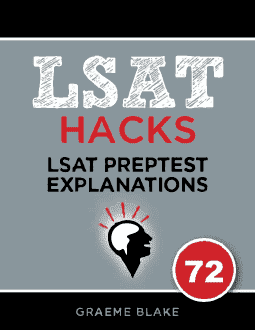This is an explanation for passage 1 of LSAT preptest 72, the June 2014 LSAT. This passage is about forest fires. It argues that too much firefighting can be bad for the forest ecosystem.
This section has paragraph summaries and an analysis of the passage, links to the explanations for the questions are below.
Paragraph Summaries
- Too much firefighting can be bad. Forests, such as ancient ponderosa forests, have regular cycles of fire. Most large trees survived these fires, and the fires cleared away brush.
- If there are no fires, fuel builds up. Then when there is a fire, the whole forest can be destroyed.
- Three factors cause fires: Topography, weather and fuel. Only fuel can be controlled by firefighters. They can reduce fuel by selective harvesting and controlled fires. Once fuel is reduced, there should be maintenance fires every 15-20 years.
Analysis
This passage has a lot of details. It’s important for you to have two things:
- A good understanding and summary of the argument.
- A grasp of the details. You don’t need to memorize them, but you should know roughly where they are.
The argument can be summarized like this:
“If we stop all wildfires, fuels burn up in forests. This eventually leads to devastating fires. We should reduce excess fuel, and then allow controlled burns to periodically clear fuel from forests.”
If you understand that, then you can get most questions.
Next, a word about details. I said you shouldn’t intentionally memorize details. But that doesn’t mean you can forget everything.
When I do a passage, I remember a lot of details without trying, just because I read carefully, and reread if I don’t understand. I also skim the passage before starting. This all helps retention.
Knowing many details helps you sift through answers faster. You can judge what matches the passage, and what is put there as a trap.
Stopping small fires leads to big fires later
Now, let’s talk about the subject of the passage. This passage is based on real life, by the way. In North America, we’ve prevented forest fires from happening. So our forests have lots of small trees and deadwood.
When a fire does happen and we can’t stop it, the fire quickly grows out of control. It burns everything, even the large trees. The forest can die entirely. This isn’t how forests used to work. In the past, fires occurred at regular intervals. The fires killed small trees, and removed deadwood. But the large trees survived.
Deadwood and small trees are what allow fires to grow. If you’ve ever made a campfire, you’ll know that the big logs won’t burn right away. You need to light smaller branches that let the fire burn strongly before the big logs will catch fire. Likewise, the large trees in forests only burn because smaller trees and deadwood let the fire burn strong enough.
So if we stop small fires, then fuel builds up in forests and when fires do happen, they are intense. The passage says that many North American forests now have an excess of fuel. So we currently can’t let fires happen. They’d be too strong. Instead, we have to clear small trees and deadwood from forests. Once enough fuel is cleared, fires will be less intense.
So after we’ve cleared enough fuel, we can start controlled burns, and let natural fires burn if conditions are damp enough. These periodic fires will clear brush, meaning we will no longer have the problem of excess fuel buildup in forests.


Leave a Reply